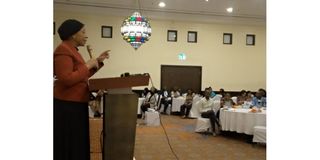Time for change: Women demand greater voice in procurement sector

Managing partner at Impact Leadership Academy, Ms Zuhura Muro.
What you need to know:
- For the first time, professionals in the field are uniting under a common banner to change that reality, championing gender-responsive procurement as a driver of economic and social inclusion.
Dar es Salaam. Despite commanding nearly 70 percent of the national budget, Tanzania’s procurement and supply chain sector has long operated without significant female representation in leadership.
Now, for the first time, professionals in the field are uniting under a common banner to change that reality, championing gender-responsive procurement as a driver of economic and social inclusion.
This transformation agenda was highlighted during a breakfast meeting held on Friday, July 18, 2025, under the theme “Empowering Women, Advancing the Profession”.
The event, organised by Women in Procurement and Supply Chain Tanzania (WIPSCT), brought together more than 100 women from across the sector.
Globally, women account for 40 percent of the supply chain workforce, yet only 17 percent hold senior leadership roles, according to the keynote speaker, founder and managing partner at Impact Leadership Academy, Ms Zuhura Muro.
In Tanzania, the gap is even wider. Of the 1,040 registered professional women in procurement and supply chain, only 105, just 10 percent, occupy leadership positions.
“This is because they operate in a world designed by men, for men,” said Ms Muro. Adding: “There is a unique opportunity for Tanzania to lead by establishing an association that shifts the narrative.”
A strategic advisor in corporate transformation, Ms Muro underscored that procurement has evolved from a back-office function into a key pillar of corporate strategy, especially in today’s digital era.
She noted that women bring natural strengths such as negotiation, collaboration, and multitasking, which are vital to supply chain success.
“Studies show that women can excel in this field. But we must be proactive. Women need to embrace technology and actively participate in the implementation of Vision 2050,” she said.
“We can no longer shy away from innovation. Women must position themselves to generate profit and drive strategic impact within their organisations,” she added.
The movement is already gaining institutional support. The Executive Director of the Procurement and Supplies Professionals and Technicians Board (PSPTB), Mr Godfred Mbanyi, pledged to support the mainstreaming of the WIPSCT agenda.
“We will champion this idea and ensure it is well understood at the Ministry of Finance, where the lion’s share of the national budget is managed,” he said.
“WIPSCT is important. It will help us highlight the contribution of women in procurement, and we are committed to supporting this cause,” he added.
The event was spearheaded by ASNL Advisory Limited Executive Director, Mr Humphrey Simba, who said the initiative aims to "change the narrative" for women in the industry.
“From my experience in procurement, I’ve seen that women are often not given the space to thrive. Through this platform, we intend to shift that space deliberately, giving women room to grow and innovate,” he said.
“If we want to transform procurement practices, we must first change how women are enabled to operate and lead within the sector,” added Mr Simba.
Ground-level barriers
One of the sector’s senior professionals and head of procurement at Stanbic Bank, Ms Ikunda Kishimbo, spoke candidly about the day-to-day challenges women face in the field.
“Women often face difficulties dealing with suppliers, most of whom are male business owners. Too often, women-led businesses are perceived as soft or informal, rather than strategic,” she said.
“Through WIPSCT, more women will be empowered to establish formal, competitive firms that we, as financial institutions, can support, not just any firms, but strategic and sophisticated ones,” she stressed.
The event sent a strong message: the time to rethink gender roles in procurement is now. With collaboration, policy support, and private sector engagement, Tanzania could emerge as a continental leader in gender-responsive transformation within a male-dominated field.
Experts believe that increasing women’s participation in procurement and supply chain management not only enhances gender equity but also boosts innovation, strengthens organisational resilience, and improves economic performance.
WIPSCT now seeks to engage policymakers, development partners, and the private sector in developing a gender-responsive procurement framework aligned with Tanzania’s Vision 2050.
As Ms Muro concluded: “This is not just about women. It’s about making procurement more effective, more inclusive, and ready for the future.”





